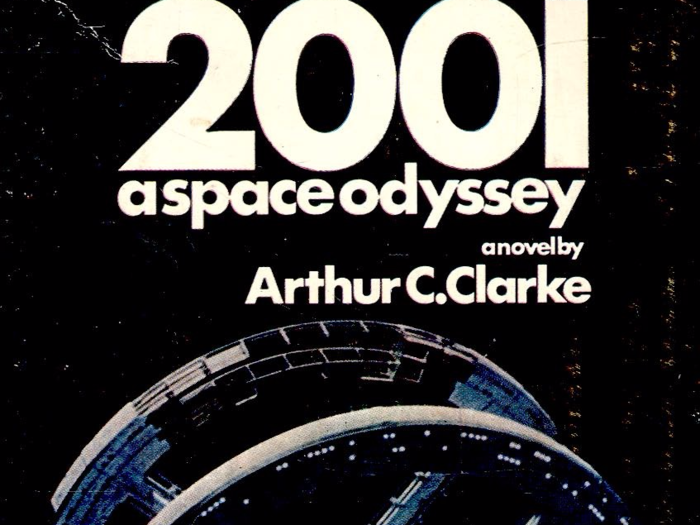
In this 1968 novel (developed in conjunction with Stanley Kubrick's film), artificial intelligence takes over a space craft — with hopes of taking over the universe.
Named HAL 9000, the computer system is so advanced that it's capable of guilty, neurosis, and even murder. The bot controls the space craft, so the crew attempts to overthrow it.

In Huxley's future, babies are born in labs, and society discourages individual action and thought. Although the world is peaceful, the protagonist, Bernard Marx, wonders if there's something more out there.
"Brave New World," published in 1932, eerily anticipates developments in reproductive technology, sleep-learning, and psychology.

In this dystopian 1953 novel, protagonist Guy Montag is a fireman in a world where television rules everything. Literature is on its way to extinction, and Montag's duty is to light the books on fire.
Like 1984, it highlights the dangers of mind control and a totalitarian state.

Published in 1948, this dystopian fiction novel by George Orwell imagined life in 1984. In a grim future, citizens are constantly monitored and controlled by Big Brother and the Thought Police.
He paints a haunting view of the world and warns about the dangers of totalitarianism in a tome that's still relevant today.

Canton, an advisor to three presidents spanning three decades, predicts future trends in business, technology, terrorism, the environment, and medicine.
Published in 2007, it's touted by NYPL as the essential forecasting handbook for the next 20 years.

In his 2011 book, physicist Michio Kaku discusses developments in technology, medicine, and travel, and predicts inventions the world may have a hundred years from now.
Among his predictions: space elevators, Internet-enabled contact lenses, and flying cars.

In this 2015 book, 10 prominent economists, including several Nobel laureates, offer their takes on what the world could look like in the twenty-second century.
These thinkers consider the future of work, salaries, equality, technology, and climate change, among other topics.

Klein challenges readers to abandon capitalism and restructure the global economy and our political system to move toward a greener future. She makes the case that moving away from capitalism will not only reduce CO2 emissions, it will also help close inequality gaps and build a better democracy.
We can either embrace radical change or the Earth will change radically, she argues in the 2014 book. Staying neutral in the climate debate is no longer an option.

Combining science and history, Kolbert highlights humans' impact on the environment in this Pulitzer Prize-winning book published in 2014.
By burning fossil fuels, we are impacting the atmosphere, oceans, and climate, forcing millions of species into extinction, she says. Kolbert combines vivid descriptions of natural wonders, like the Great Barrier Reef, and wild experiences, like venturing into a bat cave, to explain Earth's present and possible future.

"The Handmaid's Tale" is set in a dystopian future where an oppressive and religious organization takes over the US government. Young women are kidnapped, removed of their identities, and forced to bear children who are taken from them.
The story, published in 1985, touches on modern themes, like feminism, moral relativism, sexuality, and the manipulation of power. It was also recently adapted into a popular Hulu show.

This novel features 13 short stories that imagine what the future could look like.
Much like the Netflix series "Black Mirror," the narratives are a bit unnerving, and include social media implants, memory manufacturers, immersive virtual reality games, and human-like robots.
 A couple accidentally shipped their cat in an Amazon return package. It arrived safely 6 days later, hundreds of miles away.
A couple accidentally shipped their cat in an Amazon return package. It arrived safely 6 days later, hundreds of miles away. A centenarian who starts her day with gentle exercise and loves walks shares 5 longevity tips, including staying single
A centenarian who starts her day with gentle exercise and loves walks shares 5 longevity tips, including staying single  2 states where home prices are falling because there are too many houses and not enough buyers
2 states where home prices are falling because there are too many houses and not enough buyers "To sit and talk in the box...!" Kohli's message to critics as RCB wrecks GT in IPL Match 45
"To sit and talk in the box...!" Kohli's message to critics as RCB wrecks GT in IPL Match 45
 7 Nutritious and flavourful tiffin ideas to pack for school
7 Nutritious and flavourful tiffin ideas to pack for school
 India's e-commerce market set to skyrocket as the country's digital economy surges to USD 1 Trillion by 2030
India's e-commerce market set to skyrocket as the country's digital economy surges to USD 1 Trillion by 2030

Copyright © 2024. Times Internet Limited. All rights reserved.For reprint rights. Times Syndication Service.